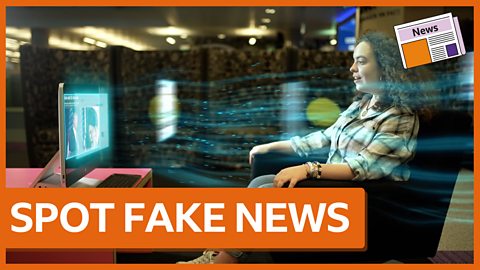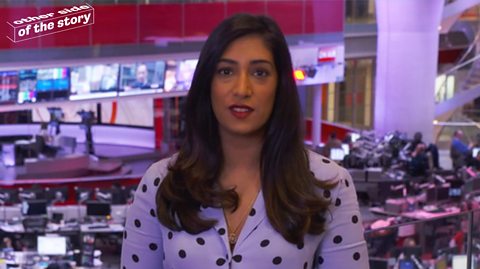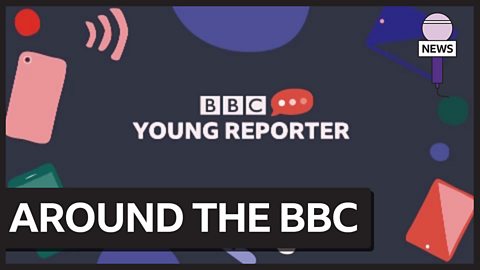Flicking through social media, it’s easy to be taken in by a flawless selfie, dramatic videos or shocking stories. But not every image we see is real.
BBC journalist Tina Daheley looks at how to check what can and can’t be believed.
Student: There’s millions of memes.
Student: Sometimes I spend three, four hours just on that.
Student: A pastime is scrolling through memes, and liking and saving them.
Student: My favourite memes are all the Shrek memes, they’re just amazing.
Student: There’s a little kid bouncing on a bed and there’s a dad who runs at him with one of those bouncy ball things and he goes flying off the bed. It’s just funny to watch.
Student: They’re funny because they make fun of serious issues.
Tina Daheley: Everyone loves a funny GIF and when you’re watching videos or sharing memes a couple of hours can just fly by. But not every video or image you see is real. So how can you spot the fake from the fact? Mostly it’s not the image that’s fake but the story the picture’s being used to tell.
Claire Milne: For example, we fact checked a photograph of a jaguar and the claim was that this jaguar had thrown itself into the river to escape the recent forest fires in the Amazon. Actually the photograph had been taken many years earlier and showed a jaguar that was the local army mascot and had nothing to do with the forest fires at all.
Tina Daheley: There are lots of clues to check the truth behind any picture. Are there street signs in a different language to the one you’d expect? Maybe there are buildings or landmarks you can identify. One of the simplest checks is a reverse image search.
Matt Cooke: It’ll give you clues around where the photograph was originally taken and that will give you some information and some evidence to start making up your own mind about where this photo actually came from. Let’s say you found an image of the Golden Gate Bridge and a crash has just happened, let’s inspect the photograph, right-click and save the image to my desktop, and now we can go over to the Google reverse image search. I’ll click on a camera and I can either paste in the URL or upload the image which I’m going to do in this case. Let’s put that in and it’ll now search that file and it’ll give me information, in this case we’re seeing actually it’s not the Golden Gate Bridge instead a very different location, it’s a famous bridge in Lisbon, Portugal.
Tina Daheley: Taking things out of context with photos is so easy you really have to keep your wits about you. This photo of Prince William looks very rude from one angle but run it through an image search and from another it’s quite innocent. He’s indicating how many children he now has. There are tools for checking videos too. Take this video of a bear chasing a snowboarder, it’s definitely got the whoa factor.
Matt Cooke: You’re seeing a snowboarder preparing to go down the slopes – she’s filming herself and she’s wearing headphones.
Student: Is that a real bear?
Matt Cooke: Let’s take a closer look. Let’s go to a new tab. Watchframebyframe.com as one example. Collect the URL and put that into this search engine, it’ll now give me an opportunity to watch this video in frame by frame instances here. And as we go through you can see the bear quickly disappears. Let’s watch that again. You can see the bear, top left there and very quickly it disappears and actually it’s because the bear was never there. It was digitally added.
Alastair Reed: Fake pictures and videos are designed to give us that strong emotional reaction so whether it’s shocking, whether it’s funny or whether it’s scary. That’s something that we need to pay attention to when we’re online.
Tina Daheley: So there are some very simple ideas that we can use if we want to make sure that what we are looking at can be believed. One, look out for clues in the picture. Two, do a reverse image search. And three, use a video checking tool. So next time you see something incredible and go whoa, why not pause, take a minute to do a couple of simple checks before you share.
Tips for checking what is and isn't real:
- Images - look for clues in the picture and do a reverse image search to find where it came from
- Video - use a video checking tool to see the action frame by frame, where you can spot anything that doesn't look quite right.
You can also look out for:
- Source – who’s posted the story? Have a look at their previous posts and their bio or ‘about’ section to find out why they are sharing
- Followers – how many followers do they have and who are they? This can tell you a lot about the person or page that is posting the stories
- Verified – do they have a blue tick? Many social platforms use this to show verified accounts, which means they are real and most likely trustworthy.
- Response – what are other people saying? Replies, comments or trending posts might show different sides to the story.
Where next?
Tips for spotting fake news online
Nihal Arthanayake looks at some simple steps which will help separate fact from fake.

Think like a journalist: How to check a story
BBC journalist Tina Daheley explains how she checks the facts when reporting on the latest news.

Fake news and BBC Young Reporter
As part of BBC Young Reporter, top journalists give you the lowdown on how to weigh up what’s real and what’s fake.

Fact or Fake?
Find out how to spot and stop fake news with BBC Bitesize.
